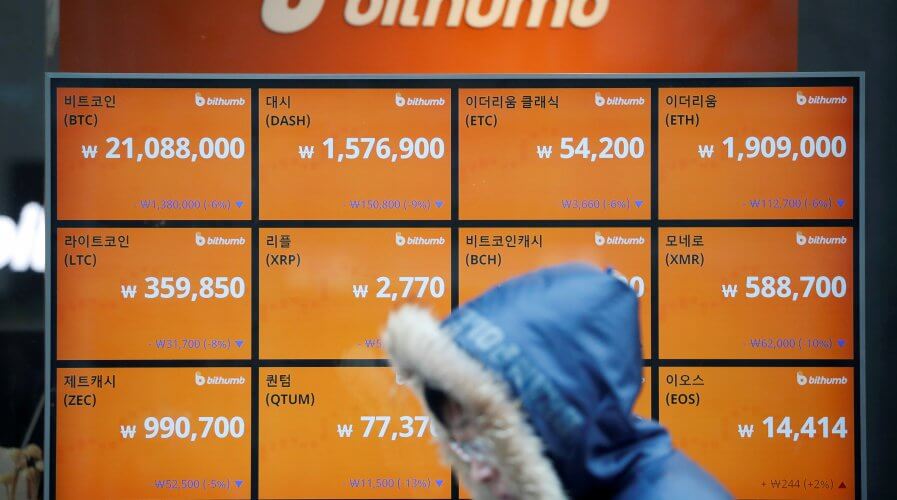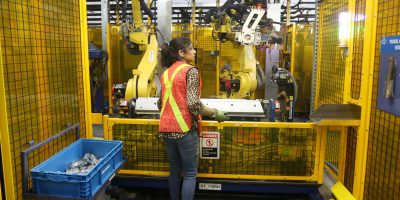
Bitcoin vs Blockchain: What is the difference? Source: Reuters
South Korea’s battle against cryptocurrencies is an uphill task
OVER US$106 billion was wiped off the global cryptocurrency market on Thursday amid news that South Korean monetary authorities were moving to ban trading of digital currencies in one of the world’s largest trading markets for bitcoin.
South Korea’s justice minister said the government is preparing a bill to ban cryptocurrency trading, throwing the virtual coin market into turmoil as the nation’s police and tax authorities raided local exchanges on alleged tax evasion.
According to Coilhils.com, the price of Bitcoin dropped more than 4 percent to 20.3 million won (US$18,968.42) after the minister’s comments from early Thursday. The local price still trades at over a 30 percent premium compared to other countries. Bitcoin was down more than 10 percent on the Luxembourg-based Bitstamp at US$13,350 BTC=BTSP, after earlier dropping as low as US$13,120, its weakest since Jan 2.
The clampdown in South Korea came as policymakers around the world struggled to regulate an asset whose value has skyrocketed over the last year.
“There are great concerns regarding virtual currencies and justice ministry is basically preparing a bill to ban cryptocurrency trading through exchanges,” said Park Sang-ki at a press conference, according to the ministry’s press office.
A press official said the proposed ban on cryptocurrency trading was announced after “enough discussion” with other government agencies including the nation’s finance ministry and financial regulators.
The nation’s largest cryptocurrency exchanges like Coinone and Bithumb were raided by police and tax agencies this week for alleged tax evasion. The raids follow moves by the finance ministry to identify ways to tax the market that has become as big as the nation’s small-cap Kosdaq index in terms of daily trading volume.
‘Bitcoin zombies’
A recent study conducted by South Korean job portal Saramin found at least three out of 10 salaried workers in the country have invested in cryptocurrencies.
The survey found that 80 percent of the investors has made money from the investment and about 20 percent recorded an average return of 425 percent on their investment.

Despite Bitcoin’s surge, sceptics say it a classic speculative bubble with no relation to real financial market activity or the economy. Source: Shutterstock.com
On average, a Korean investor owns some 5.66 million won ($5,260) in virtual currencies, making the country the world’s third-largest market in bitcoin trading after Japan and the US, QZ reported in late December.
The country has also come up with the term “bitcoin zombie” to describe people who check the cryptocurrency’s price around the clock.
Herd behaviour
Park Nok-sun, a cryptocurrency analyst at NH Investment & Securities, said the herd behaviour in South Korea’s virtual coin market has stoked concerns.
Indeed, Bitcoin BTC=BTSP’s 1,500 percent surge last year has stoked huge demand for cryptocurrency in South Korea, drawing college students to housewives and sparking worries of a gambling addiction.
“Virtual coins trade at a hefty premium in South Korea, and that is herd behaviour showing how strong demand is here,” Park said. “Some officials are pushing for stronger and stronger regulations because they only see more (investors) jumping in, not out.”
Bitcoin sank on Monday after website CoinMarketCap removed prices from South Korean exchanges because coins were trading at a premium of about 30 percent in Asia’s fourth-largest economy. That created confusion and triggered a broad selloff among investors.
Raids
An official at Coinone told Reuters that a few officials from the National Tax Service raided the company’s office this week.
“Local police also have been investigating our company since last year, they think what we do is gambling,” the official, who spoke on condition of anonymity, said and added that Coinone was cooperating with the investigation.
Bithumb, the second largest virtual currency operator in South Korea, was also raided by the tax authorities on Wednesday.
“We were asked by the tax officials to disclose paperwork and things yesterday,” an official at Bithumb said, requesting anonymity due to the sensitivity of the issue.
South Korean financial authorities had previously said they are inspecting six local banks that offer virtual currency accounts to institutions, amid concerns the increasing use of such assets could lead to a surge in crime.
Additional reporting by Reuters




